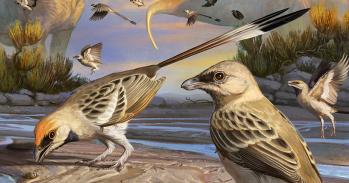
Two different projects which aim to improve our understanding of the nature of, and statistical realities behind, health scares, natural disasters, climate change and other issues, are being launched by the University of Cambridge.
Two different projects which aim to improve our understanding of the nature of, and statistical realities behind, health scares, natural disasters, climate change and other issues, are being launched by the University of Cambridge.
The popular conception of these ideas is often very unscientific. Showing people how risk works can help them to make better decisions.
Professor David Spiegelhalter
Over the next few months, researchers will be holding a series of public lectures and academic seminars, accompanied by online videos and podcasts, which aim to tackle the question of what risk really means.
The topics will include health issues, such as the spread of the swine flu virus, terrorism, government, and how we prepare for and respond to natural disasters and climate change.
Organisers hope that the line-up will encourage people to think more widely and more critically about risks, whether they are policy-makers, health officials, financial planners, or just ordinary members of the public.
The work is being led by two different institutions affiliated to the University. Darwin College's annual Darwin lectures, which are free and open to the public, will bring a series of eminent and popular speakers to Cambridge to discuss risk each week. From this Friday (January 22nd), podcasts and video will also be available for free via iTunesU and the event website, http://www.dar.cam.ac.uk/lectures/
Also on Friday, the University's Centre for Research in the Arts, Social Sciences and Humanities (CRASSH) will be holding a seminar, "Health Futures: Medical Regulation and Human Agency", as part of the Mellon Sawyer sponsored series, "Modelling Futures".
The seminars bring together disciplines that do not normally interact in order to critically examine the mathematical models used to anticipate and respond to problems like financial crises, pandemic flu and environmental hazards.
Professor David Spiegelhalter, Winton Professor for the Public Understanding of Risk at the University of Cambridge, said: "Risk, uncertainty and the associated sense of being threatened all contribute to the mood of today's society, not least because we are worried about man-made threats like the financial crisis, new drugs and terrorism."
"The popular conception of these ideas is often very unscientific. Showing people how risk works can help them to make better decisions. At the same time, however, many of the statistical models on which public bodies rely to handle these problems are themselves imperfect. So in addition to the public lectures, we are holding seminars which open up the maths behind these models to critique from other disciplines."
The opening talk from the Darwin lectures, which was given by Professor Spiegelhalter, will be online from Friday. In it, he explores the difference between risk and uncertainty, using examples such as the national lottery and sports betting, as well as recent debates about swine flu and climate change. He warns that we should all be aware that ignorance of the real nature of risk can have dire consequences.
The main lecture this week will be given by Ben Goldacre, author of the Guardian's "Bad Science" column, who will scrutinise the evidence behind the media's representation of risk information and ask how far its claims about issues such as cancer, new drugs, life-saving medicines and vaccines should be taken seriously?
Further presentations will move on to examine how the human brain judges risks and makes decisions; how the risk of blame influences the mechanics of government; whether past societies knew what risk was; how risk and the law are used in responses to terrorism; risk-measurement in dealing with natural catastrophes and the real risks behind climate change.
Organisers Dr. Michael Scott and Dr. Layla Skinns said: "We hope that this year's Darwin Lectures will help to broaden people's understanding of risk and empower them to be more aware of the processes that they are going through when they judge a risk in the first place."
The CRASSH seminars will meanwhile investigate how statistical models could be better used when predicting the spread of diseases, the impact of natural disasters and the risks involved in financial policies.
At the moment, policy-makers often prepare for issues like financial crisis or pandemic flu by using careful statistical analyses which are devised, for the most part, by scientists and mathematicians.
These often predict the impact a crisis might have - for instance, how far a disease might spread, or the number of homes which might be hit by flooding within a certain region. But they do not always take into account the way in which ordinary people will behave when disaster strikes. In looking at how people respond to risks in the environment, or determining where to invest in disaster prevention, statistical data alone is often not enough.
As well as scientists and statisticians, therefore, "Modelling Futures" will also involve philosophers, writers, psychologists, sociologists and other academics who specialise in fields linked directly to human behaviour. Eventually, the organisers hope to establish a "critical community" of scholars capable of reappraising and redesigning the existing mathematical models used to prepare for such problems by taking into account the unpredictability of human actions.
The seminar series will culminate in a major, international conference in Cambridge (September 28th - 30th, 2010).
"The risks we are discussing may be different in their nature, but they also have common themes running through them," Professor Spiegelhalter added. "We want to try to identify those themes so that they can be addressed more effectively."
This work is licensed under a Creative Commons Licence. If you use this content on your site please link back to this page.





